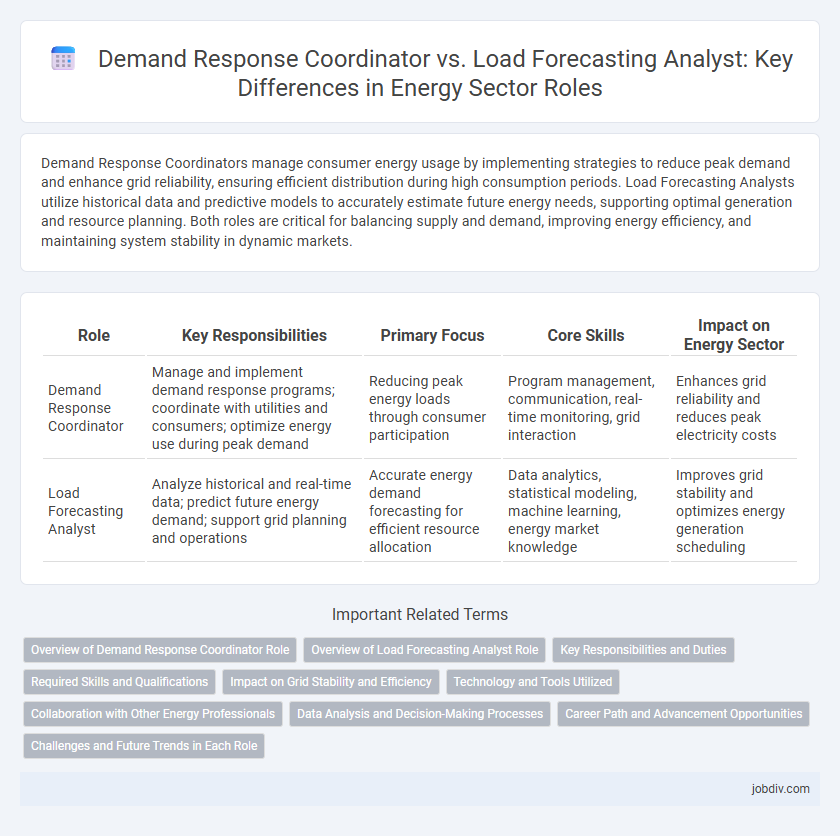Demand Response Coordinators manage consumer energy usage by implementing strategies to reduce peak demand and enhance grid reliability, ensuring efficient distribution during high consumption periods. Load Forecasting Analysts utilize historical data and predictive models to accurately estimate future energy needs, supporting optimal generation and resource planning. Both roles are critical for balancing supply and demand, improving energy efficiency, and maintaining system stability in dynamic markets.
Table of Comparison
| Role | Key Responsibilities | Primary Focus | Core Skills | Impact on Energy Sector |
|---|---|---|---|---|
| Demand Response Coordinator | Manage and implement demand response programs; coordinate with utilities and consumers; optimize energy use during peak demand | Reducing peak energy loads through consumer participation | Program management, communication, real-time monitoring, grid interaction | Enhances grid reliability and reduces peak electricity costs |
| Load Forecasting Analyst | Analyze historical and real-time data; predict future energy demand; support grid planning and operations | Accurate energy demand forecasting for efficient resource allocation | Data analytics, statistical modeling, machine learning, energy market knowledge | Improves grid stability and optimizes energy generation scheduling |
Overview of Demand Response Coordinator Role
A Demand Response Coordinator manages programs designed to reduce energy consumption during peak demand periods, optimizing grid stability and cost efficiency. This role involves real-time communication with consumers and utility providers to adjust electricity usage and implement demand response strategies effectively. Expertise in energy markets, regulatory compliance, and customer engagement is essential for successfully coordinating load reductions and enhancing grid reliability.
Overview of Load Forecasting Analyst Role
Load Forecasting Analysts play a critical role in the energy sector by using advanced statistical models and historical consumption data to predict future electricity demand. Their forecasts enable utilities and grid operators to optimize resource allocation, maintain grid stability, and reduce operational costs. By providing accurate demand projections, they support the planning and integration of renewable energy sources and inform strategic decisions in energy management.
Key Responsibilities and Duties
Demand Response Coordinators design and implement programs to manage consumer electricity usage during peak periods, ensuring grid stability and reducing operational costs. Load Forecasting Analysts analyze historical consumption data and external variables such as weather patterns to predict future energy demand with high accuracy. Both roles require collaboration with energy providers and stakeholders to optimize resource allocation and support efficient grid management.
Required Skills and Qualifications
Demand Response Coordinators require strong communication skills, expertise in energy market operations, and proficiency in demand-side management technologies. Load Forecasting Analysts need advanced statistical modeling abilities, experience with time series analysis, and proficiency in data analytics software such as Python or R. Both roles demand knowledge of power systems, but coordinators focus more on stakeholder engagement while analysts emphasize quantitative forecasting accuracy.
Impact on Grid Stability and Efficiency
A Demand Response Coordinator directly enhances grid stability by managing consumer energy use during peak demand, reducing strain on the grid and preventing outages. Load Forecasting Analysts improve grid efficiency by predicting energy consumption patterns, enabling better resource allocation and minimizing waste. Together, their roles optimize energy distribution and maintain consistent, reliable grid performance.
Technology and Tools Utilized
Demand Response Coordinators utilize advanced grid management software and real-time communication platforms to optimize energy consumption and coordinate demand response events. Load Forecasting Analysts rely heavily on machine learning algorithms, statistical modeling tools, and big data analytics platforms to predict energy demand accurately. Both roles integrate SCADA systems and energy management software, but Coordinators emphasize interactive control technologies, while Analysts focus on predictive analytics and data visualization tools.
Collaboration with Other Energy Professionals
Demand Response Coordinators work closely with grid operators, energy traders, and customer service teams to develop strategies that optimize electricity consumption during peak periods. Load Forecasting Analysts collaborate with data scientists, system planners, and utility managers to generate accurate demand projections that inform resource allocation. Both roles require seamless communication to align demand response initiatives with forecasted load patterns, ensuring grid stability and cost efficiency.
Data Analysis and Decision-Making Processes
Demand Response Coordinators utilize real-time data analysis to manage energy consumption patterns and implement strategies that balance supply and demand during peak periods. Load Forecasting Analysts employ advanced statistical models and machine learning algorithms to predict future energy demand based on historical consumption, weather patterns, and market trends. Both roles rely heavily on accurate data interpretation and decision-making processes to optimize grid stability and improve energy efficiency.
Career Path and Advancement Opportunities
Demand Response Coordinators manage energy consumption patterns by implementing real-time adjustments to reduce peak load, often progressing to roles in energy management or grid optimization. Load Forecasting Analysts specialize in data analytics and predictive modeling to anticipate energy demand, advancing toward senior analytics or operational strategy positions. Career growth in both paths depends on expertise in energy markets, data analysis, and evolving smart grid technologies.
Challenges and Future Trends in Each Role
Demand Response Coordinators face challenges in real-time grid stability and customer engagement, requiring adaptive strategies to manage fluctuating energy demand and integrate renewable sources efficiently. Load Forecasting Analysts confront the complexity of predicting consumption patterns amid increasing data volume and variability from distributed energy resources, necessitating advanced machine learning techniques and high-resolution data analytics. Future trends emphasize automation and AI-driven optimization for Demand Response Coordinators, while Load Forecasting Analysts will leverage predictive accuracy improvements through integration of IoT data and weather modeling advancements.
Demand Response Coordinator vs Load Forecasting Analyst Infographic

 jobdiv.com
jobdiv.com